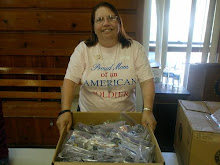
WASHINGTON, March 9, 2009 - U.S. forces in Iraq increasingly are putting down weapons to build schools in their changing role there.
Some of Diwaniya's brightest female students between 13 and 15 years old participated in their new school's opening Feb. 26.
The U.S. Army Corps of Engineers worked with the local government and contractors to open the Irshad Secondary School for Girls.
"With my partners the Iraqi engineers, and with diligent effort, we were able to provide for you this beautiful school," Army Lt. Col. Dwight Davies of USACE said. "It is a great joy and privilege to provide an opportunity for such gifted young ladies to learn and evolve and support the future of Iraq."
The Irshad students are among the top 20 percent of young female students from within and around the city.
"We are happy for this school. It is very nice," a student said in English at the ceremony, before repeating it in French, then Arabic.
"Our old school was too small and not ours. We borrowed it, shared it with others," she said, recalling the overcrowding that sometimes prevented students from having a full day of school.
The school's size provides a better environment for teaching these girls, an English-speaking teacher at the school said.
"I have girls of my own," she said, explaining why she wanted to teach young girls. She said she enjoys teaching and is happy for the new school. "I can participate in helping small girls in building their personalities and to be good people and good members of society to build the future of Iraq," she said.
During the ceremony, students waved Iraqi flags and flowers, chanting, "Long live Iraq!" They also chanted in Arabic of a brighter future, a safe country where its people prosper and flourish.
"I have three kids, so for me it's pretty inspiring and pleasant to see [students] with so much energy and enthusiasm. I was so impressed," said Mike Klecheski, leader of the U.S.-led provincial reconstruction team in Diwaniya province.
"This country is making a lot of progress, and the extent that we can be partners in this progress is wonderful," Klecheski said.
He stressed the importance of the partnership with the Iraqi government. "We work very closely with them," he said. "Construction of a school like this is really a partnership, in every sense of the word."
Soldiers with the 2nd Infantry Regiment, 172nd Infantry Brigade, and the 403rd Civil Affairs Battalion also are part of a partnership to improve schools.
Members of Abu Lakah's village council requested to meet with the soldiers at the village high school south of Baghdad to discuss how U.S. forces could help them improve the school and others. They also discussed how to help with village building projects and plans for the "Sons of Iraq" civilian security group members, said Army 1st Lt. Kirk Tooley, 3rd platoon leader for Company B, 1st Battalion, 172nd Infantry Brigade.
The village council and town members recently joined to raise money for a fence and an extra classroom, Tooley said. Even with the extra classroom, desks made for two students have four students sitting at them.
"The school not only needs at least four additional classrooms, some minor repairs are needed in the previously built classrooms," Army Capt. James Reed, a civil affairs officer, said.
Reed and Tooley offered to help the leaders send proposals to the Iskandariyah council, asking them to invest money into programs to help employ the people of Abu Lukah Sol, build up infrastructure, and build, repair and enlarge schools in the village.
Many council members told the soldiers how safe they feel in their village now. The elders said they have complete faith in the local Iraqi forces to control security situations and are thankful to the Americans for helping to secure the area and train the Iraqis.
"We live on Patrol Base Hamiya around the outskirts of Abu Lukah and other villages," Army Sgt. Brandon Waugh, squad leader, said. "As noncommissioned officers, we are used to training soldiers, so training the Iraqi army is second nature to us, and training Iraqi police to conduct presence control is also in our lane."
Waugh's younger soldiers, many just out of basic training, are now instructors, which sets them up for future success as NCOs. Waugh said he is glad to see the progress made in Iraq and shares his experience from previous combat tours with his younger soldiers.
"Every now and then you'll hear someone say something about this not being our job," Waugh said of the civil affairs work. "We leaders are quick to interrupt and let them know that this is also part of being a soldier.
"After my last tour," he continued, "I never would have thought I would go this long without being involved in a firefight or an explosion. I am here now and can honestly say Iraq is well on its way to being stable."
(Compiled from Multinational Division Center news releases. Army Sgt. Rodney Foliente of the 4th Infantry Division's 2nd Brigade Combat Team and Army Spc. Tiffany Evans of the 172nd Infantry Brigade contributed to this article.)







No comments:
Post a Comment